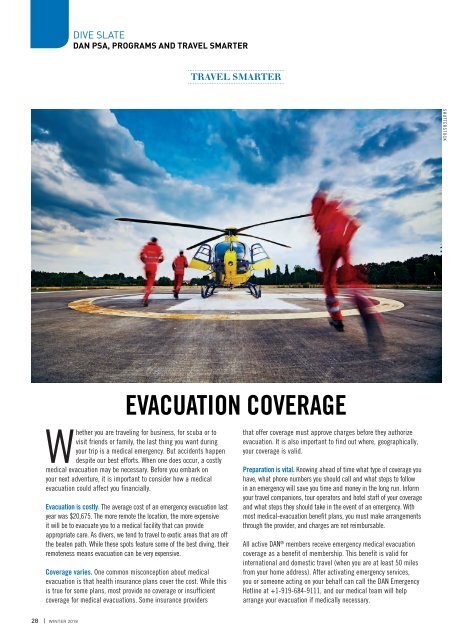AD 2018 Q1
Alert Diver is the dive industry’s leading publication. Featuring DAN’s core content of dive safety, research, education and medical information, each issue is a must-read reference, archived and shared by passionate scuba enthusiasts. In addition, Alert Diver showcases fascinating dive destinations and marine environmental topics through images from the world’s greatest underwater photographers and stories from the most experienced and eloquent dive journalists in the business.
Alert Diver is the dive industry’s leading publication. Featuring DAN’s core content of dive safety, research, education and medical information, each issue is a must-read reference, archived and shared by passionate scuba enthusiasts. In addition, Alert Diver showcases fascinating dive destinations and marine environmental topics through images from the world’s greatest underwater photographers and stories from the most experienced and eloquent dive journalists in the business.
Create successful ePaper yourself
Turn your PDF publications into a flip-book with our unique Google optimized e-Paper software.
DIVE SLATE<br />
DAN PSA, PROGRAMS AND TRAVEL SMARTER<br />
TRAVEL SMARTER<br />
SHUTTERSTOCK<br />
EVACUATION COVERAGE<br />
Whether you are traveling for business, for scuba or to<br />
visit friends or family, the last thing you want during<br />
your trip is a medical emergency. But accidents happen<br />
despite our best efforts. When one does occur, a costly<br />
medical evacuation may be necessary. Before you embark on<br />
your next adventure, it is important to consider how a medical<br />
evacuation could affect you financially.<br />
Evacuation is costly. The average cost of an emergency evacuation last<br />
year was $20,675. The more remote the location, the more expensive<br />
it will be to evacuate you to a medical facility that can provide<br />
appropriate care. As divers, we tend to travel to exotic areas that are off<br />
the beaten path. While these spots feature some of the best diving, their<br />
remoteness means evacuation can be very expensive.<br />
Coverage varies. One common misconception about medical<br />
evacuation is that health insurance plans cover the cost. While this<br />
is true for some plans, most provide no coverage or insufficient<br />
coverage for medical evacuations. Some insurance providers<br />
that offer coverage must approve charges before they authorize<br />
evacuation. It is also important to find out where, geographically,<br />
your coverage is valid.<br />
Preparation is vital. Knowing ahead of time what type of coverage you<br />
have, what phone numbers you should call and what steps to follow<br />
in an emergency will save you time and money in the long run. Inform<br />
your travel companions, tour operators and hotel staff of your coverage<br />
and what steps they should take in the event of an emergency. With<br />
most medical-evacuation benefit plans, you must make arrangements<br />
through the provider, and charges are not reimbursable.<br />
All active DAN ® members receive emergency medical evacuation<br />
coverage as a benefit of membership. This benefit is valid for<br />
international and domestic travel (when you are at least 50 miles<br />
from your home address). After activating emergency services,<br />
you or someone acting on your behalf can call the DAN Emergency<br />
Hotline at +1-919-684-9111, and our medical team will help<br />
arrange your evacuation if medically necessary.<br />
28 | WINTER <strong>2018</strong>









